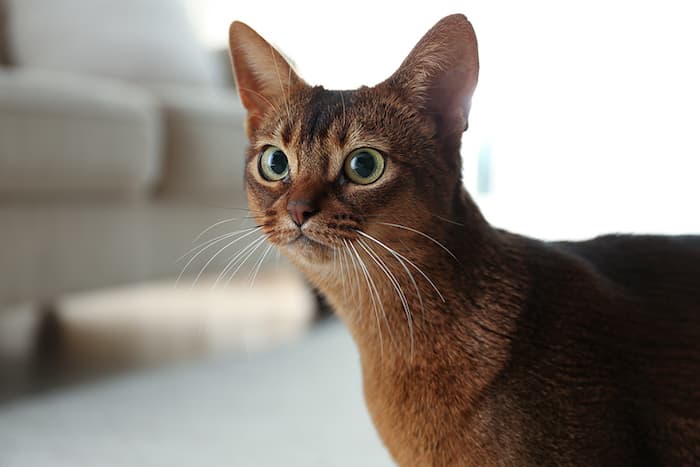Abyssinian cats are generally very sweet and playful. They are extremely loyal to at least one family member, although they can be loyal to everyone in the house. They have been known to behave in incredibly shy ways, running from guests and hiding from strangers who enter the house.
They shy away from a lot of loud noise, too. It means that if you have very noisy children, your Abyssinian may hide under the bed or somewhere else until the children are not in the house or asleep. If your children aren’t quite so noisy, the Abyssinian will come out to play with them more often.
How Much Are Abyssinian Cats?
Abyssinians, thankfully, are one of the least expensive purebred cats. You can expect to pay around $500 to $700 for a kitten. Adults that you don’t intend to breed may cost about the same or less.
What Are Some Specific Needs of Abyssinians?
Their coats are short, so you don’t have to brush them as much. They still liked being groomed, however, and a soft-bristle brush is more than adequate for their fur coats. They are extremely active cats, even into old age. Ergo, you will need to spend time keeping them amused and providing them with opportunities and toys to climb, pounce, scratch, catch, etc. A large cat tree with scratching posts and attached toys is a good idea. They generally do not need any sort of special diet.
What Is the Diet of the Abyssinian?
Feeding your Abyssinian isn’t difficult. Just make sure you feed it a high-quality food to prevent periodontal disease. Some of these cats can develop kidney disorders, which will result in early death.
Your vet can test your cat for these disorders because they are genetic. A special diet prescribed by your vet for these disorders may change what you feed your cat. Also, pregnant Abyssinian females require a different diet than non-pregnant females and males. Your vet will advise under those circumstances.
What Are Some Health Issues of Abyssinians?
As previously mentioned, these cats are prone to genetic kidney disorders resulting in kidney failure. The disorders are renal amyloidosis and diabetes. They may also develop a blood disorder known as pyruvate kinase deficiency, which makes it impossible for the cat’s red blood cells to carry oxygen to its bodily organs, resulting in organ failure and death.
Patellar luxation is the popping out of the cat’s knees and can be quite painful, especially if the knees remain popped out and a vet has to pop them back into place. The cats can also go blind from progressive retinal atrophy, another genetic condition affecting these sweet cats. Finally, the Abyssinian is subject to hyperesthesia, a neurological condition that causes your cat to lick fur off until it has bald spots and then run crazily around the house for no reason all the time. If the cat also develops an aversion to allowing you to pet it, it is a sure sign that it has developed hyperesthesia.
More Cat Breeds

